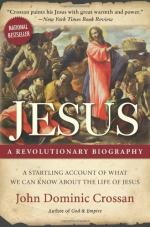
|
| Name: _________________________ | Period: ___________________ |
This test consists of 15 multiple choice questions and 5 short answer questions.
Multiple Choice Questions
1. Why does the author think that crucifixion is the ultimate punishment?
(a) It takes longer than other punishments.
(b) Sometimes one does not die.
(c) You are faced with going to hell.
(d) It destroys an individual physically and morally.
2. Complete the following title: "A Corpse for the... "
(a) The Faithless.
(b) The Pretty Boys.
(c) Wild Beasts.
(d) The Romans.
3. What feast does the author talk about in Part Six?
(a) Thanksgiving.
(b) Harvest.
(c) Christmas Day.
(d) Passover.
4. Complete the following sentence: "extended to others as both challenge and ..."
(a) Encouragement.
(b) Empowerment.
(c) Fallacy.
(d) Myth.
5. Who does the author say was an important part of Jesus' traveling ministry?
(a) Romans.
(b) Children.
(c) Slaves.
(d) Women.
6. What does the author think that Jesus' casting out of demons is a metaphor for?
(a) The casting off of the ego.
(b) The casting off of oppressive authority.
(c) The casting off of family restrictions.
(d) The casting off of hate.
7. What does the author state was different about Jesus and his beliefs about the Kingdom of God?
(a) He did not believe them.
(b) He acted upon them.
(c) He could convince powerful people of the validity of his claims.
(d) He believed them.
8. What other disease does the author say attracted negative attention to its victims?
(a) Small pox.
(b) Consumption.
(c) Measles.
(d) Cancer.
9. What does the author call Jesus' miracles like walking on water and filling the the fisherman's nets with fish?
(a) Life miracles.
(b) Nature miracles.
(c) Miracles of the fantastic.
(d) People's miracles.
10. What title was Jesus' brother bestowed with?
(a) The Jinx.
(b) The Honest.
(c) The Just.
(d) The Lithe.
11. Who would eat the remains of a man left on a cross?
(a) The upper-class Romans.
(b) Birds and dogs.
(c) Lions and tigers.
(d) The poor.
12. Which Greek philosophers does the author say inspired Jesus?
(a) Virgil.
(b) Plato.
(c) The Cynics.
(d) Socrates.
13. What does the author say must be present for oppressed groups to revolt?
(a) A weak government.
(b) Great desperation.
(c) Hatred of authority.
(d) Strong family structure.
14. What does the author say he is searching once again in Chapter Six?
(a) Homer's poems.
(b) The scriptures.
(c) The light.
(d) The darkness.
15. Complete the following title: "The Arts of..."
(a) Revolution.
(b) Resistance.
(c) Laughter.
(d) Faith.
Short Answer Questions
1. What is the first idea that the author challenges about Jesus in this section?
2. What does the author say defined the actions and intentions of anyone who helped write the New Testament?
3. What two things do the quotes at the beginning of Part Seven contemplate?
4. What does the author say the resurrection stories were based on?
5. How was James different from Jesus?
|
This section contains 469 words (approx. 2 pages at 300 words per page) |

|




